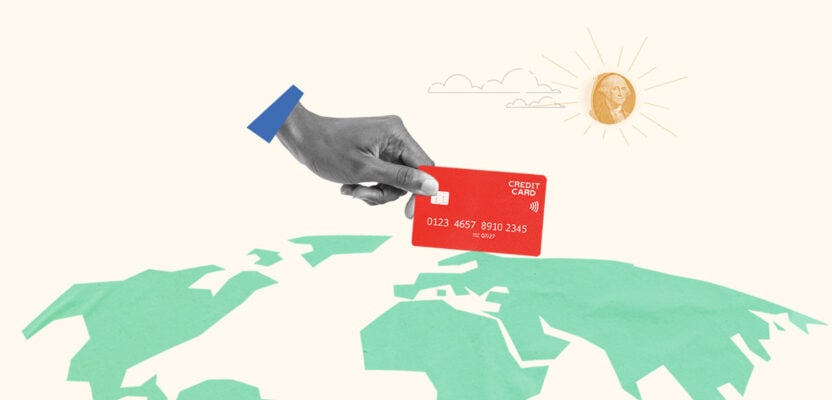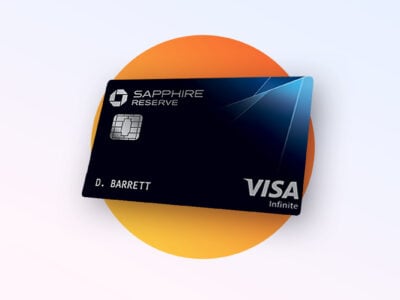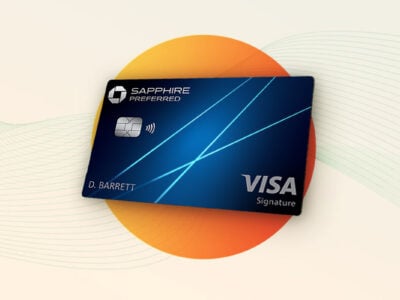If you’re going abroad, there are a lot of good reasons to take a credit card with you—one of the biggest being that it’s much safer than carrying large amounts of cash.
However, it’s best to plan ahead as much as possible to avoid any nasty surprises when you try to use your card outside the US. Here are ten tips you can use to get the most out of your credit card during your travels.
Table of Contents
- 1. Check whether you can use your credit card internationally at all
- 2. Set up a travel notice
- 3. Check how much your credit card charges for international transactions
- 4. Avoid dynamic currency conversion fees
- 5. Understand contactless and chip credit cards
- 6. Check your credit card’s international travel protection policy (and other travel benefits)
- 7. Apply for a travel rewards card
- 8. Bring more than one credit card
- 9. Bring cash and a debit card as backups
- 10. Consider using a digital wallet
1. Check whether you can use your credit card internationally at all
If you’re heading abroad, confirm in advance that you’ll be able to use your credit card outside the US. Most cards allow foreign transactions, but some prohibit them.
If you’re not sure whether your card will work internationally, call your credit card issuer. Their customer service phone number will be printed on the back of your card, and you’ll also probably be able to find it on the issuer’s website.
Note that even if your card allows foreign transactions, there’s no guarantee that every international merchant will accept it. That depends on which credit card network it belongs to.
Which credit card networks are easiest to use internationally?
The four major credit card networks are Visa, Mastercard, American Express, and Discover. Here’s how their international use breaks down:
- Visa and Mastercard: These two types of cards are the most widely accepted in the world, and both are very reliable for overseas transactions. You’ll be able to use them pretty much anywhere you go—Mexico, Canada, Europe, Asia, and more.
- American Express and Discover: It’s possible to find international merchants who will take American Express and Discover, but they’re not as universally accepted as Visa and Mastercard, so they’re less reliable.
Generally, gift shops and restaurants that are aimed at tourists are more likely to accept all four card networks. Shops aimed at locals may only accept Visa and Mastercard. If you’re an avid traveler, make sure you have a card on one of those two networks.
What should you do if your credit card doesn’t allow foreign transactions?
If your credit card isn’t suitable for international transactions, the obvious solution is to just get another card that is. If you can, aim for one that offers travel rewards (described further down in this article).
If you have a bad credit score, it could limit your access to travel-appropriate credit cards. If you’re struggling to get accepted, you may need to improve your credit score first.
2. Set up a travel notice
Before you go abroad, you should call your credit card company and set up a travel notice (also known as a travel notification or travel alert). This is a memo to let your credit card company know that you’ll be traveling in the near future.
Most credit card issuers want to know in advance that you’ll be making purchases in a different location so that they won’t flag your card activity as potential fraud.
If your card allows foreign transactions, you’ll probably also be able to set up a travel notice on your credit card company’s website (or mobile app).
When you contact your card issuer, it’s also a good idea to:
- Update your contact information in case they need to get in touch with you about suspicious activity on your card
- Ask for a number that you can call if you need assistance while you’re away. This way, you’ll be able to contact them free of charge if you have an issue with your card.
3. Check how much your credit card charges for international transactions
One of the disadvantages of using credit cards when traveling is that many cards have foreign transaction fees. Fees vary from card to card, but they tend to be around 1%–3%. This may not sound like much, but it’ll start to mount up if you make a lot of purchases while you’re abroad.
Fortunately, there are some cards that charge no foreign transaction fees. Consider getting one if you travel a lot; it could save you a lot of money. The foreign transaction fee on Capital One cards is always 0%, for example.
Foreign transaction fees also apply to online purchases
If you’re not actually traveling but you plan on using your credit card for an online purchase from an international vendor, be aware that foreign transaction fees apply to these as well. Make sure you know where your seller is based when you pay for products or services over the internet.
4. Avoid dynamic currency conversion fees
As well as foreign transaction fees, there’s another trap to watch out for while you’re traveling: dynamic currency conversion fees (DCC fees).
Dynamic currency conversion is an optional service you can use when you buy things in other countries. It allows you to pay for your purchases in US dollars rather than the local currency.
For example, if you use your credit card in Mexico, by default, your spending will be in pesos. With DCC, you can opt to use US dollars instead. Since you’re probably more used to dollars, this makes it easier to grasp exactly how much you’re spending.
Unfortunately, using DCC isn’t free, so you’ll pay a fee (along with any foreign transaction fees you’re already paying—it will stack on top of them, not replace them). When you pay with your card and they ask whether you want to use the local currency or convert to US dollars, it’s cheaper to just opt for the local currency.
5. Understand contactless and chip credit cards
Not all countries and merchants use the same processing methods for credit card payments. There are four different ways to process payments:
- Chip-and-signature: This is the most common payment method in the US. 2 With this, you have to insert your credit card into a card reader. It will scan the chip on your card, and then you’ll use your signature to authorize your purchase.
- Chip-and-PIN: This method requires you to use a four-digit PIN to verify each transaction you do. It’s less commonly used in the US and more widely used elsewhere.
- Contactless: Contactless credit cards allow you to pay by tapping or waving your card over a card reader. Contactless payments—sometimes referred to as “tap-and-go” or “tap to pay”—are very common in Europe.
- Magnetic stripes: As well as a chip, you have a magnetic stripe on your card that allows you to swipe it and then use your signature to verify the payment. Although you may find places where you’re only able to use a magnetic stripe to make payments, many countries are phasing out this method, with merchants often refusing to accept it.
What to do before you travel
Check whether your credit card allows contactless and chip-and-PIN payments. If it does, make sure yours already has a PIN set (issuers don’t always automatically set one for you). If you don’t have a PIN, contact your card issuer and ask them to send yours to you, then memorize it.
The more payment methods your card allows, the better. If your card lacks either contactless or chip-and-PIN capabilities, you’ll probably encounter shops that won’t accept it, so you should come prepared (i.e., by carrying cash).
If you can, get at least one credit or debit card that allows chip-and-PIN payments before you go abroad. Cards issued by Citi, for example, always offer this. 3
6. Check your credit card’s international travel protection policy (and other travel benefits)
Some credit cards offer various types of travel insurance. This means that if you get sick on your trip, you might be eligible for reimbursement of your medical costs. You might also be able to get compensation for problems like trip cancellation, flight delays, or lost luggage.
Before your trip, check your credit card terms and conditions or contact your issuer to find out what travel protection policies your card has.
Make sure you fully understand the different types of coverage you can get and how to qualify for them. For example, to get insured for baggage or trip delays during a flight, you may be required to use your card to pay for your plane ticket.
Some cards come with more travel benefits
If you have a luxury travel credit card, it’ll include all kinds of perks that will come in useful for your trip. Luxury cards can come with high annual fees, but they might be worth it, especially if you travel a lot.
The perks you might get include:
- Access to concierge services
- Priority boarding or free checked bags
- Free access to airport lounges
- Free credits to use during hotel stays (e.g., to buy food or spa treatments)
- Other benefits that could save you money
If you have a decent relationship with your current credit card issuer, consider calling them up and asking if they have any premium travel cards you can apply for.
7. Apply for a travel rewards card
Ideally, your wallet will feature at least one rewards credit card. This type of card allows you to earn credit card points, airline miles, or cash back on your purchases.
If you’re going on vacation, it’s even better if you have an actual travel rewards card. This will give you bigger returns for purchases such as meals, hotel stays, entry to museums and attractions, and other categories you’re likely to spend a lot on during your trip.
Before applying for a card, check whether the terms of its rewards program apply outside the US. Some cards only offer rewards on in-country purchases, or feature reduced rewards rates for purchases made while abroad.
8. Bring more than one credit card
You never want to have all your eggs in one basket. It’s always possible you’ll lose your credit card, or your card issuer will flag your transactions as fraudulent and freeze it—even if you notified them of your travel plans beforehand.
For this reason, it’s best to take more than one card when you travel, just in case.
Don’t forget to also check your card’s expiration dates to make sure that your card won’t expire during your trip. You don’t want to be stranded overseas with a credit card that doesn’t work.
9. Bring cash and a debit card as backups
Although credit cards are one of the best ways to pay for purchases while you’re traveling, there can always be problems with any payment method.
Make sure you always have debit cards and cash as a backup, including local currency. However, don’t put your cash, credit card, and debit cards all in one wallet. It’s better to keep them separate in case your wallet is lost or stolen.
10. Consider using a digital wallet
Digital wallets or e-wallets are another very useful tool for travelers. These are apps that allow you to make quick and easy payments from your bank account and your credit or debit cards. Apple Pay and Samsung Pay are two popular examples.
Not all merchants accept digital wallets as a form of payment (yet), but many do. They’re a great contingency plan in case you leave your wallet at home or it’s stolen and you only have your phone on you. Consider setting one up on your phone if you haven’t already done so.






